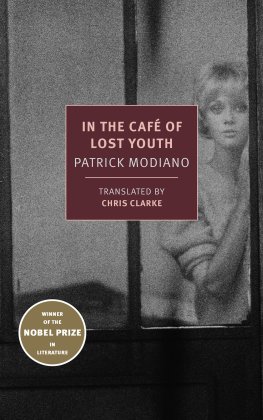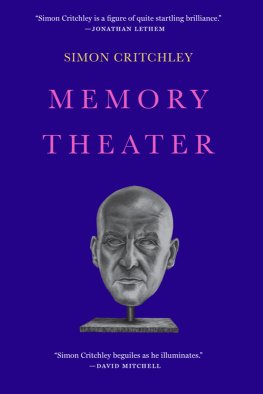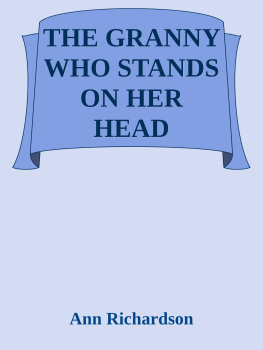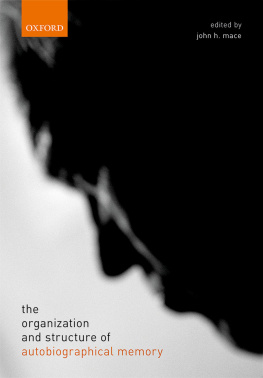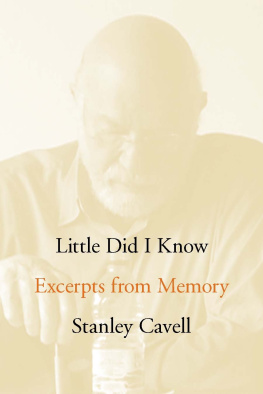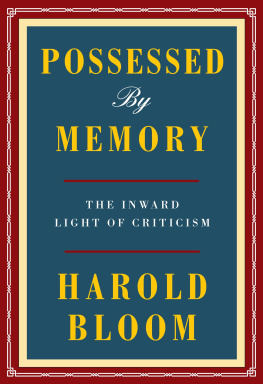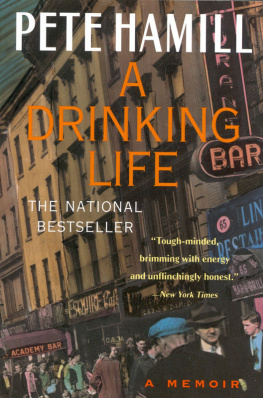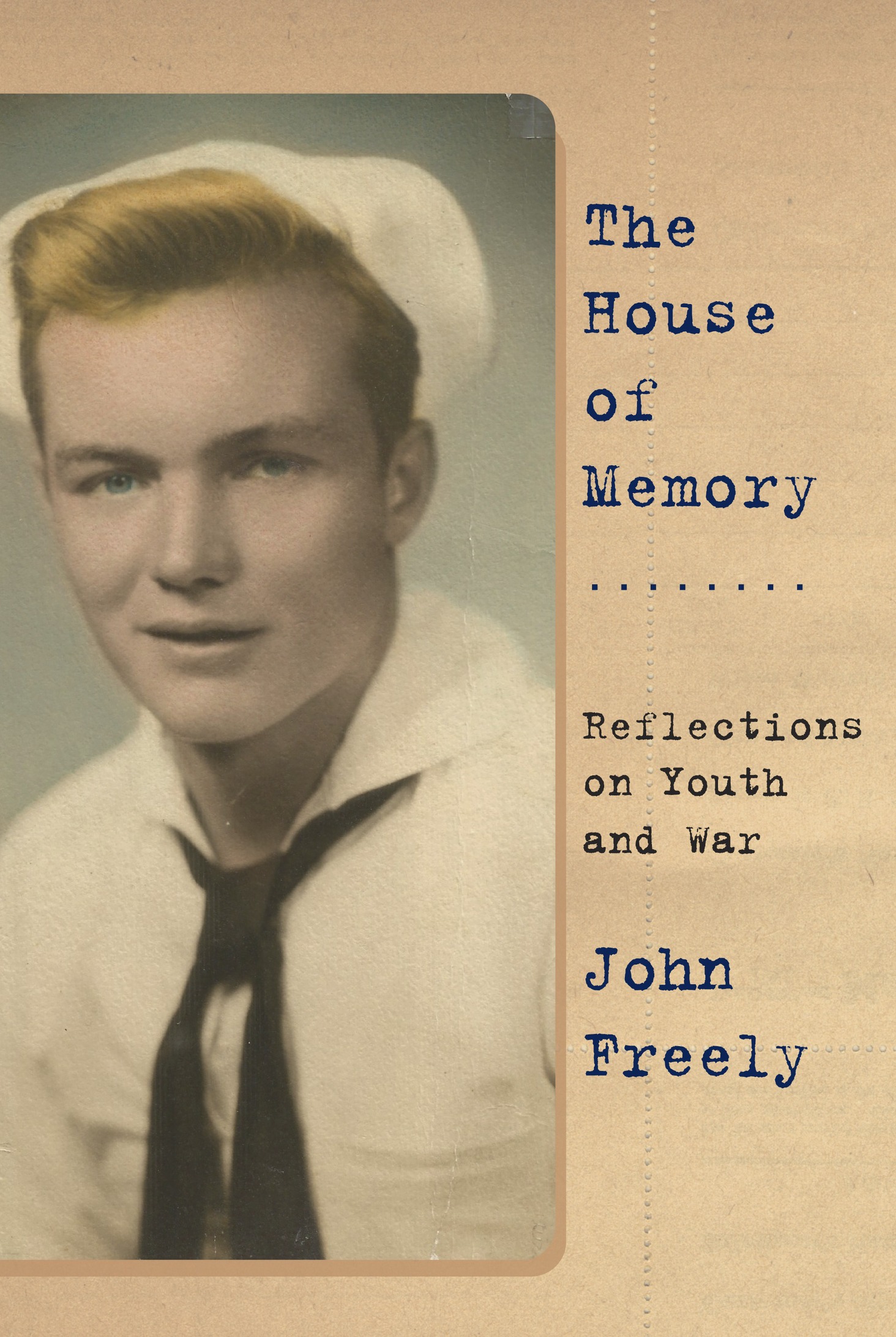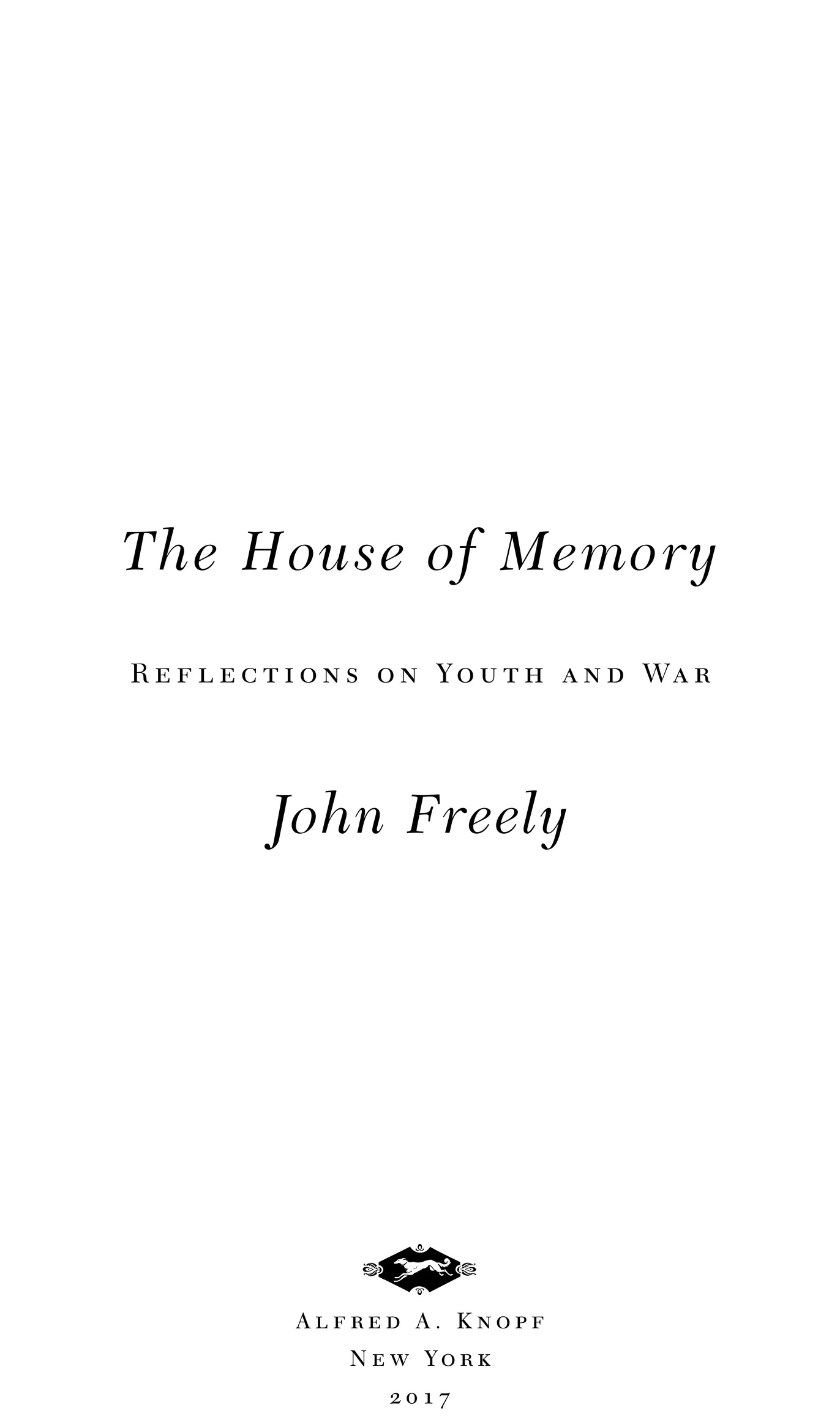Also by John Freely
Aladdins Lamp (2009)
Jem Sultan (2004)
The Lost Messiah (2001)
Inside the Seraglio (2000)
Istanbul: The Imperial City (1996)
Strolling Through Venice (1994)
Strolling Through Athens (1990)
Classical Turkey (1990)
The Western Shores of Turkey (1990)
Crete (1988)
This Is a Borzoi Book Published by Alfred A. Knopf
Copyright 2017 by John Freely
All rights reserved. Published in the United States by Alfred A. Knopf, a division of Penguin Random House LLC, New York, and distributed in Canada by Random House of Canada, a division of Penguin Random House Canada Limited, Toronto.
www.aaknopf.com
Knopf, Borzoi Books, and the colophon are registered trademarks of Penguin Random House LLC.
Grateful acknowledgment is made to the following for permission to reprint previously published material:
Alfred Music: Excerpt of Dont Fence Me In (from Hollywood Canteen ), words and music by Cole Porter. Copyright 1944 by WB Music Corp, copyright renewed. All rights reserved. Reprinted by permission of Alfred Music.
Alfred Music and Songs of Peer, Ltd.: Excerpt of Skylark, words by Johnny Mercer Music and music by Hoagy Carmichael. Copyright 1941 by the Johnny Mercer Foundation and Songs of Peer, Ltd. All rights for the Johnny Mercer Foundation administered by WB Music Corp. All rights for Hoagy Carmichael administered by Songs of Peer, Ltd. All rights reserved. Reprinted by permission of Alfred Music and Songs of Peer, Ltd.
Hal Leonard LLC: Excerpt of Lili Marlene, words and music by Mack David, Hans Leip, and Norbert Schultz. Copyright 1943 by Universal-Polygram International Publishing, Inc. and Chappell & Co., Inc., copyright renewed. All rights reserved. Excerpt of (Therell Be Bluebirds Over) The White Cliffs of Dover, words by Nat Burton, music by Walter Kent. Copyright 1941 by Shapiro, Bernstein & Co., Inc., New York and Walter Kent Music, California, copyright renewed. All rights outside the United States controlled by Shapiro, Bernstein & Co., Inc., New York. International copyright secured. All rights reserved. Used by permission. Reprinted by permission of Hal Leonard LLC.
Library of Congress Control Number: 2016963012
ISBN 978-0-451-49470-2 (hardcover)
ISBN 978-0-451-49471-9 (ebook)
Ebook ISBN9780451494719
Cover photograph from the Freely family collection
Cover design by Carol Devine Carson
v4.1
ep
Contents
In memory of Charles Shelmerdine, John Jacob Esau, and Ching Ging Too
These are the men who laid down the splendor of their manhoodthey are no more, but they have left the fairest memorial of their valor.
Epitaph of the Greek warriors who fell at the Battle of the Eurymedon in 466 BC
When I remember them, those friends of mine,
Who are no longer here, the noble three,
In vain I stretch my hands to clasp their hands;
I cannot find them. Nothing now is left
But a majestic memory. They meanwhile
Wander together in Elysian lands,
Perchance remembering me, who are bereft
Of their dear lives, and remembering, smile.
J OHN K EATS, Three Friends of Mine (1818)
Chapter 1: Sailing Against the Tide
M y mother was born in Ireland as Margaret Murphy, but everyone called her Peg. She never used her married name, Mrs. John Freely, always identifying herself as Peg Murphy. This was not uncommon among the Irish women of her time, but it was mostly her fierce spirit of independence that made her keep her own name, for she was Peg Murphy and not Mrs. Somebody Else, she always said. We were led by her to believe that she had been born in 1904, but I learned many years later that her true date of birth was 1897. I never found out why she subtracted seven years from her age. Perhaps it was to be eternally young, for she often spoke of going off to Tir na ng, the land of the hearts desire, where in Celtic myth no one grows old. So Peg told me one day. Many years later I read Eavan Bolands numinous rendering of this whispered promise:
Fair woman, will you come with me
to a wondrous land where there is music?
Hair is like the blossoming primrose there;
smooth bodies are the color of snow
There, there is neither mine nor yours;
bright are teeth, dark are brows,
A delight to the eye the number of our hosts,
the color of fox-glove every cheek.
She was one of eleven children, all but one of whom left Ireland and emigrated to the United States. They were helped by relatives in Lawrence, Massachusetts, from an earlier family migration. Her paternal grandfather had died on the roads when he and his family were evicted from their home in the last years of the Great Hunger, after which his widow and surviving children had emigrated to America and found refuge in Lawrence. But her eldest son, Pegs father, Tmas Murphy, had not taken to life in America and returned to Ireland, though none of his family was left there.
Tmas was born in County Kerry on the Dingle Peninsula, which together with the Kenmare Peninsula to its south forms the southwesternmost extension of Ireland. When Tmas returned from America he found work as a porter for the Irish Railways, on the narrow-gauge line that operated between Tralee, capital of County Kerry, and Dingle, the main town on the peninsula. At the beginning of his first day of work an English tourist, getting on at Tralee, pointed out his trunk on the platform and arrogantly ordered Tmas to put it up on the luggage rack. Put it up yourself, said Tmas proudly, walking away to help an old Irishwoman board the train. The conductor, observing this, said, Murphy, you will not grow gray in the service of the Irish Railways.
Tmas kept the job for about a year, but then he was dismissed for giving another English tourist a piece of his mind about Britains treatment of Ireland. It was just as well that he left, for the following Whitsunday there was a terrible accident on the TraleeDingle line. Locomotive Number One swerved off the tracks on the Curraduff Bridge and fell thirty feet into the river, killing the engineer, the conductor, the porter, and ninety pigs, who were the only passengers that day. An old woman in Dingle remarked to Tmas that he had been spared by the hand of God, to which he responded, according to Peg, Im sure the Almighty had more important matters to think about that day than the fate of three Irishmen and ninety pigs.
Soon afterward Tmas met and fell in love with a pretty young schoolteacher named Maire Ashe, whose father was the postmaster in Anascaul, the only town of any size between Tralee and Dingle. Tmas and Maire married and settled down in a tiny cottage by the sea four miles east of Inch, the enormous transverse sand cape on the south coast of the Dingle Peninsula. Tmas became a fisherman, making himself a small currach, a wickerwork boat covered with tarred canvas. He also built a little dock to moor his currach, in a cove below his cottage, that is still called Murphys Landing. On the hillside behind the cottage he cleared and walled in a small plot of land and planted it with potatoes, cabbage, barley, and hay, building a small barn that sheltered a cow, a donkey, and a score of chickens. He farmed his little plot and at intervals set his nets and lines for codfish and herring in Dingle Bay, searching the rocky strand at low tide for periwinkles and mussels. With these resources, Tmas and Maire raised eleven children, five of them boys and six girls, all of whom survived their childhood, something of a miracle in rural Ireland at the time.


